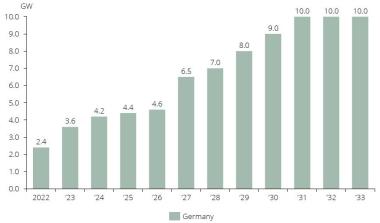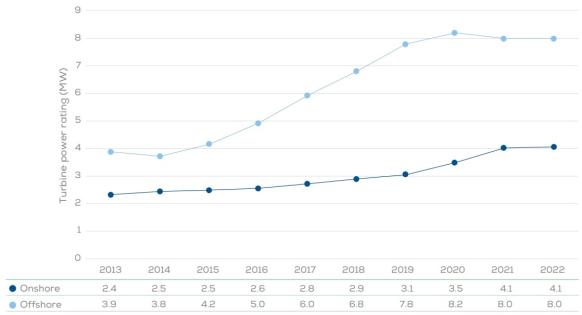Germany's wind builders push for transport reform to curb delays
Complex and finicky permitting rules are delaying the transport of large wind farm components and could jeopardise national renewable energy targets, industry experts said.

Related Articles
Germany's accelerated renewable energy targets are set to put pressure on all levels of industry and government.
New laws have hiked wind installations and the allocation of new projects but developers say delays in transport permits could threaten national goals.
Germany aims to double onshore wind capacity to 115 GW by 2030 as part of a plan to end its reliance on Russian oil and gas. To meet this target, wind installation rates must triple to five to six turbines per day, a spokesperson for utility RWE told Reuters Events. Delays in securing transport permits could threaten this target.
Last year, one third of all wind projects were behind schedule due to transport delays, according to estimates from the German Federal Wind Energy Association (BWE).
Delays in transport permitting are important as developers need some flexibility until projects get closer to construction in order to align component delivery and crane rental.
Growing turbine capacities are requiring more trips per project and transport challenges impact new wind power projects as well as the repowering of existing sites with larger units.
Forecast onshore wind installations in Germany
(Click image to enlarge)
Source: Brinckmann Group, January 2024
The main drivers holding back transport permitting are a lack of permitting staff and complex and outdated procedures that involve local, state and federal government, industry experts said.
It can take four months to secure transport permits for outsized loads in Germany, a spokesperson for Norwegian utility Statkraft told Reuters Events.
In the Netherlands or Denmark, developers can gain transport permits in a couple of weeks, due to more streamlined allocation processes and progressive rules on transport supervision.
In January, BWE called on the German authorities to make transport permitting faster, more predictable and uniform. Current rules are "delaying projects and making project implementation massively more difficult,” it said.
Solutions proposed by the industry include greater flexibility in allocating permits to specific vehicles and preliminary route checks ahead of formal applications to save resources. A key challenge would be implementing new regulations at regional and federal government levels.
"Solutions have been tabled and are being discussed with officials,” BWE spokesperson Frank Gruneisen said.
Admin overload
Developer PNE suffered an 11-week delay on one wind farm project because of transport permit delays, a company spokesperson told Reuters Events, declining to name the array.
Developers must "run a gauntlet of German bureaucracy," Gruneisen said.
Companies must obtain permits from a wide range of federal, state and municipal authorities and each state has different regulations. Some guidelines date back to 1992, when turbines were far smaller, and some permit application software is 17 years old, engineering association VDMA found in a 2022 study.
States have to check motorway routes planned by logistics companies with federal motorway authority Autobahn GmbH before they allocate a permit. Separate state authorities provide permits for non-motorway routes.
Average power rating of new wind installations in Europe
(Click image to enlarge)
Source: WindEurope, March 2023
Permits are tied to an individual vehicle, so if it is not available, for example due to a breakdown, the permit is invalid.
“The same applies if the weight or measurements of the convoy are different from what was permitted, even if the convoy is lighter or shorter," Gruneisen said.
As a result, many transport companies file permit applications for every one of their trucks that could do the specific job, creating more workload for the authorities, he noted.
Long permitting durations mean they are often approved at different times, which makes it difficult to plan important deliveries such as crane rental efficiently, the Siemens Gamesa spokesperson said.
It is not practical to apply for permits several months in advance as plans can change during that time and permits must be used close to the stipulated date, the spokesperson noted.
Faster Autobahn
In late 2023, Autobahn launched a digital permit application platform and this has "significantly shortened processing times" at the motorway level, Gruneisen said.
However, major challenges remain at non-motorway level and the platform does not reduce the total number of permit applications, he noted.
Although Autobahn says that 98% of all applications gain approval, most of these are simple applications for smaller vehicles than those needed by wind installers.
Even when wind projects are permitted, there are often a lot of restrictions. Applicants are often not permitted to drive at certain times due to highway construction work. Siemens Gamesa hopes greater automation under the new platform will provide staff with more time to find solutions for more challenging routes.
To combat the permitting challenge, the wind industry has proposed solutions such as enabling transport companies to pre-check entire routes - motorway and non-motorway - with the authorities before permit applications are submitted. There are also proposals to shift some transport to inland waterways going forward.
Wind industry participants also want more flexibility in allocating permits to vehicles or combinations of vehicles, allowing transferability between vehicles or flexibility in weight and measurements if dimensions are reduced.
Gruneisen urged action and said he hopes the “delays will be solved before they can cause a major disruption in the targets.”
Reporting by Neil Ford
Editing by Robin Sayles


